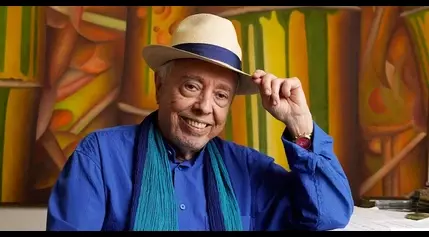Entertainment

The Maestro of Bossa Nova: Sergio Mendes' Enduring Legacy in Popular Music
Sergio Mendes, the Brazilian-born pianist, composer, and arranger, passed away on Thursday in Los Angeles at the age of 83. Mendes rose to fame in the 1960s with his ensemble, Brasil '66, bringing the alluring rhythms of bossa nova to a global audience. For more than six decades, he remained a formidable force in popular music, leaving an indelible mark on the industry through his innovative sound and soulful contributions.Elevating Bossa Nova to New Heights
Sergio Mendes' musical journey began in his native Brazil, where he honed his skills as a virtuoso pianist and arranger. His big break came in 1962 when he performed at a bossa nova concert at Carnegie Hall, sharing the stage with renowned artists like Antonio Carlos Jobim, the composer who helped shape the genre. Mendes' captivating performance caught the attention of American audiences, and he soon returned to the United States, determined to make his mark.In 1964, Mendes fled his homeland in the wake of a military coup, bringing with him a newfound desire to succeed in the American music scene. He formed the ensemble Brasil '66, a group that would go on to define the sultry, sophisticated sound of bossa nova for a generation.The group's debut single, "Mas Que Nada," written by Brazilian singer-songwriter Jorge Ben, became an instant hit, introducing the world to Mendes' unique blend of rhythmic complexity and melodic elegance. The song's lilting, sensual pulse embodied the adult contemporary cool that contrasted sharply with the rising youth culture and the dominance of rock 'n' roll on the pop charts.Expanding the Boundaries of Bossa Nova
Mendes' approach to bossa nova was deceptively sophisticated, yet remarkably accessible. He amplified the original guitar-centric murmur of the genre with expansive keyboard-driven arrangements and cooing vocal lines that often featured his own voice alongside a front line of two female singers. This innovative sound captivated audiences, who found in Mendes' music a refreshing alternative to the prevailing musical trends of the era.The Latin music scholar Leila Cobo observed in the 2020 HBO documentary "Sergio Mendes in the Key of Joy" that Mendes' music was "completely different from anything, and definitely completely different from rock 'n' roll." This distinctive quality spoke to Mendes' unwavering commitment to his artistic vision, as he never tried to emulate the sounds that were dominating the pop charts.A Prolific and Award-Winning Career
Over the course of his illustrious career, Sergio Mendes released nearly 35 albums, earning three Grammy Awards and a nomination for an Academy Award in 2012 for his co-writing of "Real in Rio," the theme song for the animated film "Rio." His ability to seamlessly blend elements of Brazilian music with contemporary pop sensibilities made him a sought-after collaborator, and he worked with a diverse array of artists, from Stevie Wonder to will.i.am.Mendes' impact on the music industry extended beyond his solo work. He helped to introduce the world to the rich tapestry of Brazilian music, paving the way for a new generation of artists to explore the country's rich cultural heritage. His influence can be heard in the work of countless musicians who have been inspired by his innovative approach to composition and arrangement.A Legacy of Timeless Elegance
Sergio Mendes' passing marks the end of an era, but his legacy as a pioneer of bossa nova and a trailblazer in popular music will endure. His music, with its alluring rhythms and timeless elegance, has the power to transport listeners to the sun-drenched beaches of Brazil and evoke the sophisticated charm of a bygone era.Through his work, Mendes not only elevated the profile of bossa nova but also expanded the boundaries of what was possible in popular music. His unwavering commitment to his artistic vision and his ability to adapt to changing trends while maintaining his signature sound have cemented his place as one of the most influential figures in the history of Brazilian and global music.As the world mourns the loss of this extraordinary musician, his music will continue to inspire and captivate audiences for generations to come, a testament to the enduring power of his artistry and the lasting impact of his remarkable life.

